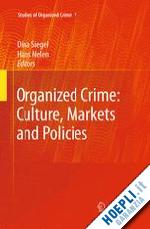
Questo prodotto usufruisce delle SPEDIZIONI GRATIS
selezionando l'opzione Corriere Veloce in fase di ordine.
Pagabile anche con Carta della cultura giovani e del merito, 18App Bonus Cultura e Carta del Docente
Dina Siegel is an Assistant Professor at the Department of Criminology and Criminal Law, Vrije Universiteit Amsterdam. She studied sociology and social anthropology at Tel Aviv University in Israel and obtained her PhD in cultural anthropology at the Vrije Universiteit of Amsterdam, the Netherlands. She has studied and published several articles on post-Soviet organized crime, terrorism, human trafficking, criminal activities in diamond sector, and on drug policies in the Netherlands. In 2003 she edited (together with Van de Bunt and Zaitch) Global Organized Crime. Trends and Developments (Kluwer Academic Publishers, 2004). She conducted ethnographic research on Russian-speaking criminals in the Netherlands, Russian biznes in the Netherlands (2005, Meulenhoff).
Hans Nelen is a criminologist and has a law degree. Between 1986 and the beginning of 2001 he was employed as a senior researcher and research supervisor at the Research and Documentation Centre of the Ministry of Justice in the Netherlands (WODC), mainly investigating drug crime, fraud and corporate crim. Between 2001 and 2006 he was a senior lecturer and senior researcher at the Institute of Criminology of the Vrije Universiteit Amsterdam. Since January 1 2007 Nelen has been working as a Professor of Criminology at Maastricht University (UM). During the last decade Nelen published several books and articles on a variety of criminological subjects, i.e. corruption and fraud, dilemmas facing lawyers and notaries, the administrative approach to organized crime, the proceeds-of-crime approach, evaluation of legislation, and evaluation of law enforcement activities.











Il sito utilizza cookie ed altri strumenti di tracciamento che raccolgono informazioni dal dispositivo dell’utente. Oltre ai cookie tecnici ed analitici aggregati, strettamente necessari per il funzionamento di questo sito web, previo consenso dell’utente possono essere installati cookie di profilazione e marketing e cookie dei social media. Cliccando su “Accetto tutti i cookie” saranno attivate tutte le categorie di cookie. Per accettare solo deterninate categorie di cookie, cliccare invece su “Impostazioni cookie”. Chiudendo il banner o continuando a navigare saranno installati solo cookie tecnici. Per maggiori dettagli, consultare la Cookie Policy.